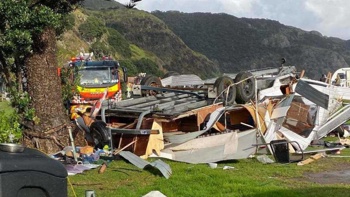LISTEN TO LEAD NEGOTIATOR LIAM RUTHERFORD TALK WITH LARRY WILLIAMS ABOVE
The primary teachers' union will vote on rolling regional strikes in November, after rejecting a proposed two-day national strike.
Their union, the NZ Educational Institute (NZEI), failed to reach agreement on the next steps in their pay dispute as scheduled this morning, and had to allow more time for debate this afternoon.
Just after 5.30pm, president Lynda Stuart said the union's national executive had decided to recommend rolling one-day strikes in the week between November 12 and 16, starting in Auckland on the Monday and ending in Wellington on the Friday.
All members will be asked to vote on the proposal in an electronic ballot between October 16-25.
NZEI's lead negotiator Liam Rutherford says they're likely to be on strike for five days.
He told Larry Williams the sense of feeling from their annual conference over the last couple of days is really strong.
"We're hearing stories about principals back in the classroom, classrooms being split, and when we're starting to talk about things like that, their normalised in the school system. It's when we're verging on this teaching crisis becoming a disaster."
Rutherford says the country will be split into five regions during the week-long action, and each principal will decide which day of the week they will strike.
However, he says they're keen to continue negotiations.
The union is seeking a 16 per cent pay increase over two years plus more staffing, including for special needs coordinators (Sencos) and reducing the staff/student ratio in Years 4 to 8 from 1:29 to 1:25.
The Ministry of Education has offered a revised 9.3 per cent pay rise over three years. It has not offered any significant change on staffing, although Associate Education Minister Tracey Martin has issued a draft plan, which is still subject to funding, to put Sencos into all schools.
Teachers who attended rallies in all the main cities during the NZEI's first strike on August 15 voted overwhelmingly by voices to support a two-day national strike rather than rolling regional stoppages, and the NZEI executive appears to have expected that to be endorsed at the union's conference in Rotorua.
Media were banned from the debate in which the 400 delegates, sitting around 37 tables, discussed four options at each table: a two-day national strike, one-day regional strikes, a work-to-rule and a withdrawal of some teaching hours.
Members said some tables opposed a two-day strike because of the financial cost to teachers with mortgages and other commitments.
Some others opposed the strike options out of concern for the students and their parents, fearing that sole parents and other low-income parents could not afford to take more days off work to look after their children if their teachers went on strike.
Some proposed other actions such as taking buses to Wellington decked out with protest banners to gather public support.
Stuart acknowledged that the financial cost of a two-day strike was an issue and said the union would provide information for members struggling to cope with lost pay in the rolling strikes. But she said the union had no strike fund for welfare purposes.
Meanwhile, the Post Primary Teachers' Association (PPTA) starts its annual conference in Wellington tomorrow(Tuesday) and is also expected to reject the Education Ministry's initial offer in response to a PPTA claim of an immediate 15 per cent pay rise and a rental housing allowance of up to $100 a week in Auckland, Tauranga and Queenstown.
PPTA president Jack Boyle said in Rotorua that his union was not planning any immediate industrial action.
"We are at the table, and will continue to be at the table," he said.
He said teachers refused to accept that the Government could not afford to pay them a big pay increase because it was committed to "budget responsibility rules" - keeping core government spending to about 30 per cent of gross domestic product (GDP) and reducing the public debt to 20 per cent of gross domestic product by 2022.
"Where there's a will, there are multiple ways," Boyle said.
"If your children are in a classroom today in any secondary school in NZ, 40 per cent of those schools have classes that are being merged because they can't get relievers. Your child is in a classroom that is suboptimal for learning because they are in a class that is merged or with a teacher who is not trained for the subject they are learning, or is in a classroom without a registered teacher or being led by a student with no adult at all.
"That is not going to meet anybody's learning needs."
Take your Radio, Podcasts and Music with you









